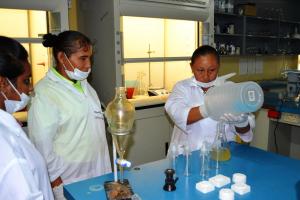
[www.inewsguyana.com] – The first group of Indigenous producers from Region Nine to benefit from assistance to improve their standards of production, via a partnership between the Ministry of Social Cohesion and the Institute of Applied Science and Technology (IAST), has been participating in enhancement and quality assurance training at the IAST laboratories.
Recently, 15 persons were flown to Georgetown and taken to the labs for training, where they were introduced to the technology being used to improve the textures and scents of the soaps and lotions that they produce.
According to the Ministry of the Presidency, they were also taught to utilise materials in their environment to achieve the same standard as those produced in the laboratory.
It was noted that in November, the Ministry and IAST had committed to undertake projects aimed at increasing the earning power of Amerindian producers, in keeping with the ministry’s goal of empowering communities to enhance lives.
Minister of Social Cohesion, Ms. Amna Ally said that social cohesion and national unity cannot be achieved without economic and financial stability. As such, she said, the Ministry is engaging stakeholders to determine what is needed to support community empowerment.

At that first meeting with farmers and producers, Professor Suresh Narine, Director of the IAST, had committed to flying 15 members from the working groups to the IAST labs in Georgetown to see first-hand the enhancement methods that are being used to add value to their products.
According to the Ministry, Dr. Narine said that over the past decade or so there has been a movement of indigenous products and knowledge into the market place. However, he noted that to compete with the outside world, quality and consistency must be assured.

The group was also taught the science of soap making, how to deal with variables, branding for the products, how to maximize profits, maximizing raw materials and labour, cost to profits ratios and how to draft a business plan to access funding.
Additionally, on a monthly basis, random testing will be conducted by the IAST to ensure that quality control is maintained and technical support will be given until the producers can meet that standard.
With regard to peanut butter producers in the region, the IAST will be providing the necessary equipment to repair broken machinery to put production back on track. Several other projects are expected to be undertaken in the new year.
























This is positive!
I have been trying to find out whatever has happened to the “Rupununi Weavers” group? It is a production group of Women based at St. Ignatius who used to send some excellent nut butter and cashew nuts to Georgetown. But for over three years now I have not seen any of these products in Georgetown.